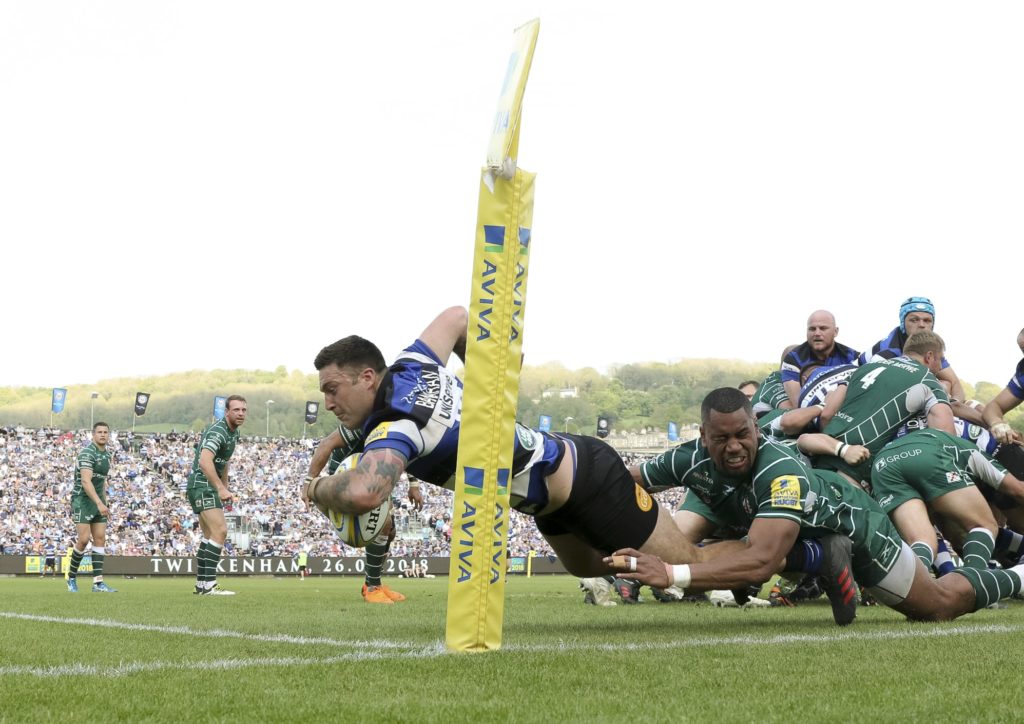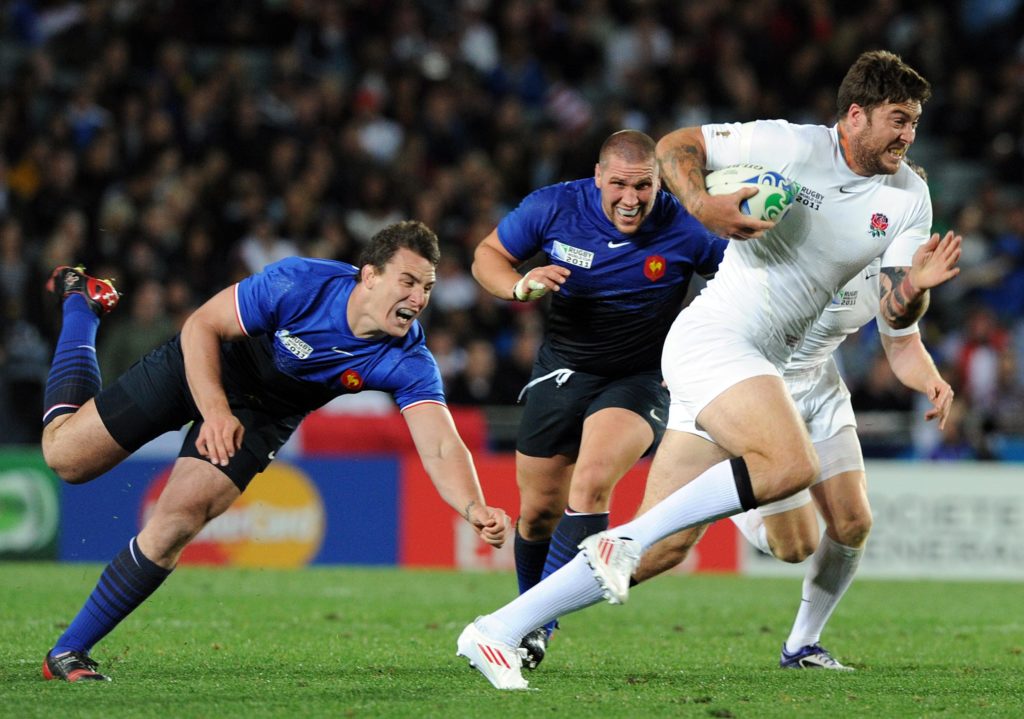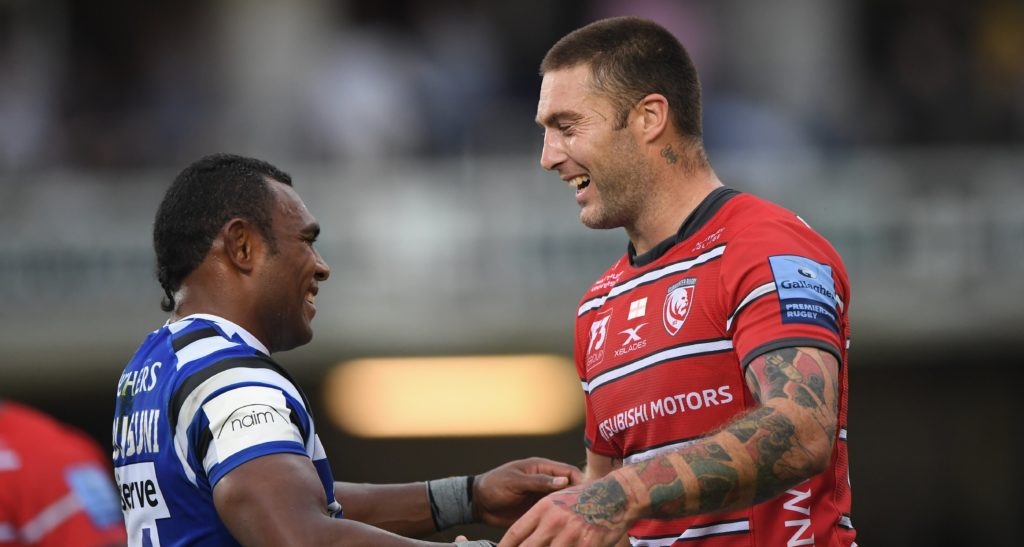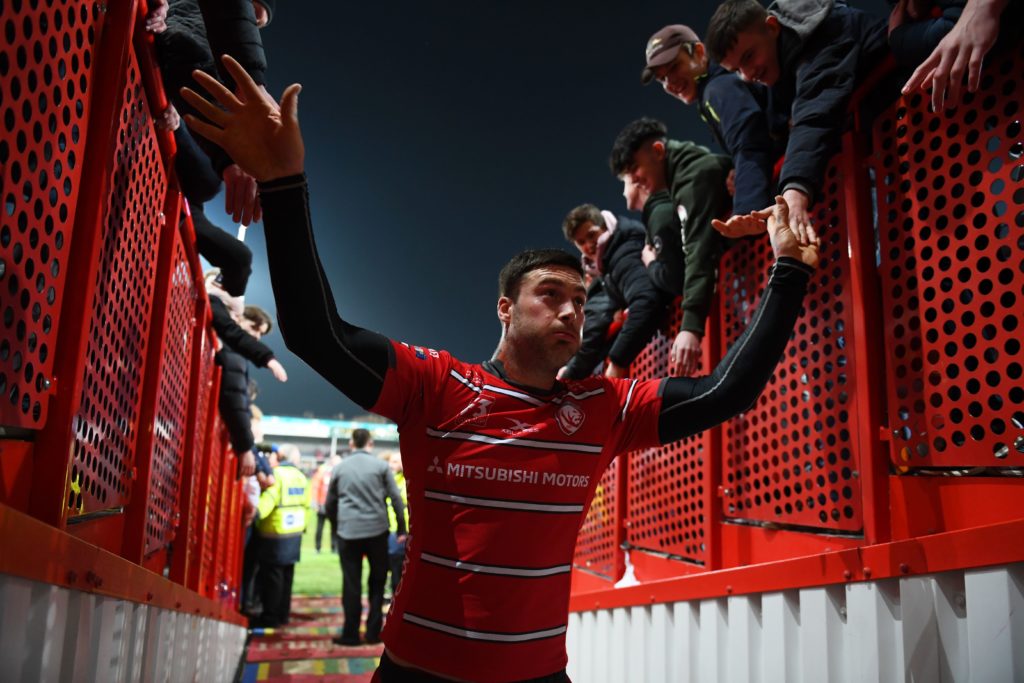It has been three months since Matt Banahan last laced up his boots. Three months to take stock on a storied career that took in more than 300 professional games and a World Cup in New Zealand in 2011.
For the 6ft 7in wing, who lies in sixth on the all-time tryscorers list in the Premiership, the transition, which many find so hard, has been relatively painless. He accepted some time ago that professional sport is a gift, one you know will end sooner or later.
As a kid from Jersey who was given the opportunity to play for 15 years without going under the surgeon’s knife he knows he’s been lucky. So when he was asked what his ambitions for the coming season were by the Gloucester hierarchy, he was adamant. He wanted out. “I was straight with them. I said my goal is to retire. I never wanted it to be taken away from me through injury, or through the critics crowing, ‘You’re not good enough’. I wanted to finish on my own terms,” he says.
By giving himself a year’s notice, he reasoned, it was enough time to go out into the real world, meet people, get it all planned and cut the cord on the professional game.
A year on, he has just started a job at the Glasshouse Charity in Bath, but you won’t be seeing the towering wing bedecked in a suit anytime soon. It’s not his style. In recent weeks, he has been able to afford himself a wry smile seeing former team-mates going through the rigours of pre-season training, without once feeling pangs of wanting to be back out there.
“I’m not missing what would have been my 17th professional pre-season one bit. The older you get, the less fun it gets. I accept I’m from a previous generation, one used to playing on rain-sodden pitches. Those 4G pitches have killed me in the last two or three years. It was time to bow out,” he says.

Banahan grew up in the small island community of Jersey with parents who imbued a strong amateur sport ethos in him, and to play with a smile on my face. “My dad is 6ft 1in, 19st, and a black belt in karate. He has had two new knees and a hip replacement but he’s a big old boy who played indoor hockey for England. Mum was a county athlete,” he says.
It wasn’t rugby that dominated Banahan’s early sporting aspirations but hockey and cricket, playing West of England hockey and county cricket to Under-19 level for the Channel Islands. Indeed, it was only after he hadn’t made the England Under-19 cricket squad that he picked up a rugby ball to play with his mates. He was 17.
Unlike many players now who are flushed down the academy route from 13 or 14, Banahan pinballed around South West 3 with Jersey before gaining promotion to National Division 2, where he was spotted by Corin Palmer and Toby Booth while playing in a Hampshire league. The duo – now at the Ospreys – took a punt on him to play as a back-five forward for the London Irish academy.
In my first year a lot of alcohol was consumed but, unlike in London where you can get away with murder, everything gets back to the club because Bath is a bubble.
Matt Banahan
In his formative years as a blindside flanker, Banahan watched and learnt. “Back then, I didn’t know what professional rugby was. I’d be blowing my gasket in training because I was trying so hard,” says Banahan. “Senior players like Neal Hatley, Robbie Russell, Rob Hardwick and Danie Coetzee put their arm around me and said, ‘Banners, do it like this’. They didn’t want some overly keen youngster 100 metres ahead of them in fitness tests. You definitely learnt more about being a team player in that era.”
While at London Irish, Banahan’s raw ability started gaining admirers and while at a training camp at St Mary’s University in south-west London, he caught the attention of Bath head coach Brian Ashton. “I was rubbing shoulders with the likes of Danny Cipriani, Danny Care, Shane Geraghty, and it was while I was doing a few sprints that he sidled up to me and said, ‘If I had a choice, I’d sign you as a wing’. He chatted to my agent and before you knew it, I was heading down the M4 to Bath.”
While a fresh-faced 19-year-old Banahan found his feet in his new home, he found Ashton heading in the opposite direction when he took the call from Twickenham to take over with England. “In my first year, it was very much like London Irish where a lot of alcohol was consumed but, unlike in London where you can get away with murder, everything gets back to the club because Bath is a bubble. I went back to Jersey in the summer and my brother asked, ‘Did you give it your all?’ and I said, ‘Not really’. So he said, ‘Get your head down, we’re carrying on training’.
Looking spritely on his return, Bath’s then-DoR Steve Meehan narrowed his eyes and interrogated his newly enthused athlete, ‘What have you been doing?’ I said I’d been putting in the hard work because I hadn’t given it my best, so he said, ‘Right then, your training partner this season is Danny Grewcock!’”

The revered England lock would have Banahan out of bed up at 6.30am where the order of the day was fighting, wrestling, boxing and lifting weights. “Looking back, it was a blessing in disguise. Sometimes working hard and keeping your mouth shut gets you a lot further in life,” says Banahan.
The move from south-west London suited Banahan, who had been out of sorts going from an island with a population of less than 100,000 to a global capital with nearly 9 million people. “It was overwhelming being in London. Everything in Jersey is a stone’s throw away, but in London you were often living 30 or 40 miles away from your mates. It wasn’t my cup of tea,” he adds.
By the end of his first season of professional rugby, he was on England’s radar. He had declined an England Sevens invitation to go to the Hong Kong Sevens to play in the European Challenge Cup and scored a hat-trick against Leeds. An England Saxons call-up followed before an invitation to train with England.
From pitching up for his first game of rugby as a raw 17-year-old to playing for England at 21, Banahan’s rise had been meteoric.
At Bath, he was welcomed into the inner sanctum by ‘Flats’ (David Flatman), ‘Mearsy’ (Lee Mears), ‘Grewy’ (Grewcock), ‘Borthers’ (Steve Borthwick) and ‘Belly’ (Duncan Bell). These were gnarled professionals with big characters. Alpha males who controlled how the group moved, while in the backs he had World Cup-winner Butch James to look up to.
I asked if I was getting a testimonial and they said no. The penny then dropped that my loyalty to Bath was between me and the supporters, not me and the club.
Matt Banahan
While the squad were tight, matters did get out of hand on more than one occasion, with one infamous end-of-season social making the headlines after reports of drug use and a dust-up with Harlequins players resulted in star names Justin Harrison and Michael Lipman being hauled over the coals. “Sensibly, I went to only one end-of-season social in 12 years,” says Banahan with a smile. “I don’t go out and get leathered, it’s just not my scene.”
Of the fateful night, he recalls a text from the team manager in the morning asking if he’d gone to it. “I replied, ‘No’ then I was told to ignore the next message. I viewed it and thought, ‘Christ, what happened?’ It’s fair to say it caused quite a stir,” he adds.
Years later, the Sam Burgess roadshow rolled into town. Another matter that captured the public’s attention. “That was all a bit odd. I have nothing against Sam. He was a bit of pawn in it all really,” says Banahan.
“He told a few of the boys a representative of the RFU flew out to Sydney and told him, ‘If you come back to the UK you can play in a World Cup as a centre’. As far as he was concerned, the package was good and it was an intriguing offer. I suppose you play this sport for a short time and try to make as much money as you can, I get that. It got a bit ugly after the World Cup and he looked after himself. No one died, but the fallout was messy.”

Banahan will forever be synonymous with Bath. Yet after 12 seasons at the Recreation Ground and 264 games, he left for rivals Gloucester, feeling he had no choice but to up sticks. It was a decision that cut him and his family deeply.
“Hindsight is a wonderful thing in sport. I’d have loved to spend the rest of my career at Bath but after all those years, I had a piss-poor contract offer. Given the salary cap had risen by £2.5m over my time there, I’d say my market value had gone up. I asked if I was getting a testimonial and they said no. The penny then dropped that my loyalty to Bath was between me and the supporters, not me and the club,” says Banahan. “Corin Palmer had said to me all those years ago at London Irish, ‘You have to remember rugby is a business. If it’s not you, they’ll find someone cheaper. I had to get my head around it.”
Like a man emerging, blinking out of a long-term relationship, at 31, Banahan had to survey the market and find a suitor sharpish. “I had a meeting with Bristol’s Pat Lam, David Humphreys, and Thomas Castaignede at Toulouse but I knew a lot more boys at Gloucester and it came down to them offering one more year than everyone else. Thankfully I took it which was a godsend because of Covid. If I’d taken a one-year deal I might have been in a very different place. I guess it was fate,” he adds.
‘Zam’ is the fastest player I’ve ever seen on a rugby pitch, period, and I still don’t think he has realised his potential. Watching him run, he has such natural talent. Once he learns the game, he’ll be unstoppable.
Matt Banahan on Louis Rees-Zammit
After three enjoyable seasons at Kingsholm, Banahan says he is grateful for the experience. “I learnt a huge amount about playing with Gloucester. You know, how to handle myself, how to help others. For this season, I truly believe that if Glaws can get a serious pack of forwards to provide those backs with ball, they’ll be very dangerous,” says Banahan. “Adam Hastings is used to 4G pitches and knows how they roll. He’ll be key to their success.”
Not too shabby in the speed stakes in his galloping pomp, Banahan says he had to park his ego when training alongside Louis Rees-Zammit and watch the vapour trails. “‘Zam’ is the fastest player I’ve ever seen on a rugby pitch, period, and I still don’t think he has realised his potential,” he says. “Watching him run, he has such natural talent. Once he learns the game, he’ll be unstoppable. Speed is his super-strength.”
As for the other flank, with the silky Santi Carreras and thundering Ollie Thurley pushing hard, is 66-cap England wing Jonny May under pressure? “With Jonny, he’s triple the player he used to be. When he first came on the scene, he was like a headless chicken but his knowledge of the game is now so good. When him and Zam are on the wings, you have the best of both worlds,” says Banahan.

As for what he’ll miss, he shakes his head and says the refereeing of the tackle area is not one of them: “The high-shot stuff has confused the life out me. We play the game knowing it’s a contact sport. I got a red card in my last game for Gloucester because someone tried to dive to score a try and hit the bottom of my chin. Constant changes in the rules are becoming very difficult to cope with as a player.”
Fortunately, Banahan can leave the vagaries of the disciplinary process behind him thanks to his role at Glasshouse, a charity in Bath to help kids raise their aspirations and create opportunities from an early age: “From the outside, many people think Bath is only an affluent area but there are pockets of poverty, so we’ve gone into primary schools around Bath and selected kids who might need a little more support outside school. The idea is they come to me aged nine and stay on the programme until they’re 18. We’ve broken it down into three areas. Years 5, 6 and 7 is about fun, helping them with their language, learning about themselves and behaviours, instilling manners and setting expectations. Years 8, 9 and 10 is about assisting them at school, playing games. Years 11, 12, and 13, our goal is to get them on an apprenticeship, get them into work or to a university.”
Banahan hopes that if the charity grows, they’ll be able to find bursaries to help them. “I’m not their teacher but if I change one kid’s life in the next 10 years, I’ll feel like I’ve achieved as much as anything I did on the rugby field,” he says.
Honestly, it means more to me if people relate to me as a good bloke than being a half-decent rugby player. In your career, two or three years after you finish playing, nobody gives a monkey’s who you are.
Matt Banahan
As for regrets about hanging up his boots, Banahan says he’s at peace with his new pathway. “If I’m honest, after 15 years in the game, now is the time to focus on myself and my family. You forget how much rugby takes out those close to you. They have to deal with not seeing you at weekends, your mood swings, your body soreness. It’s not all glamour, you know,” he says.
While he had dabbled in commentary and hopes to stay around the game, Banahan doesn’t believe rugby defines him. “Honestly, it means more to me if people relate to me as a good bloke than being a half-decent rugby player. In your career, two or three years after you finish playing, nobody gives a monkey’s who you are,” he says.
“Hopefully, down the line, I want people to think about Matt Banahan who runs the Glasshouse children’s charity, not the knackered old rugby player. People hang their hat on it for too long. It’s funny, I say to my son now, ‘Do you remember being held by Jonny Wilkinson as a baby after one of the England games?’ and he’ll say, ‘Nah, but was Owen Farrell playing?’ It’s amazing how quickly people move on.”
Earnest and perceptive, it seems the fans will miss Banahan more than he will miss the game. He has no regrets. Time to make a difference in the real world.
More stories from Owain Jones
If you’ve enjoyed this article, please share it with friends or on social media. We rely solely on new subscribers to fund high-quality journalism and appreciate you sharing this so we can continue to grow, produce more quality content and support our writers.



Comments
Join free and tell us what you really think!
Sign up for free